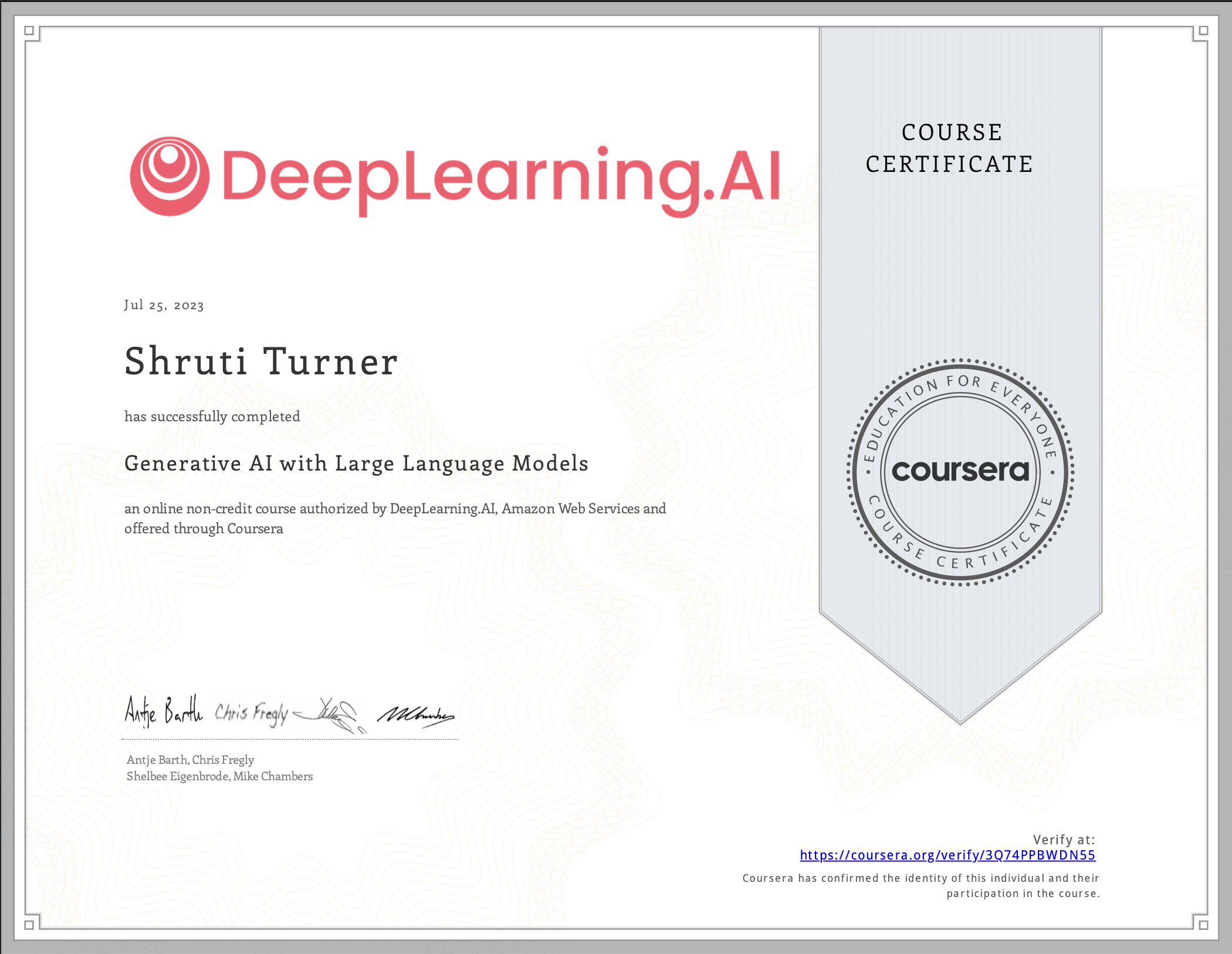Coursera Course: Generative AI with Large Language Models

Dr Shruti Turner
This past few weeks, I've been working my way through Coursera's 'Generative AI with Large Language Models' course. The course has been provided by DeepLearning.AI and Amazon Web Services. I feel like I've learned a lot and am more equipped to understand how to use LLMs, but also how they work and what the necessary considerations are.
In this article, I'll be giving a rundown of my thoughts and reflections having completed the course.
Why this course?
Honestly, it was recommended to me by the Senior Data Scientist I work with who leads on the GenAI projects. So really, a no brainer to take a look. My latest project assignment is to address an issue, where the potential solution is to use a LLM - we're still working out the specifics as we are early stages. Before this course, I was aware of what LLMs and GenAI were, but I couldn't honestly say that I could talk about them technically, know what their pitfalls could be in detail or how to address them. To be able to tackle my work conundrums, and also for my interest and personal learning, it made sense to give this course a go!
What's covered in the course?
The course is split into five sections across three "weeks". The weeks are just a recommended learning time, but really no one is monitoring this. The course takes you through the GenAI project lifecycle, from start to finish. The first topic is an introduction to LLMs and what this lifecycle even is - including the different stages. From there, we move on to pre-training and scaling, different ways to fine-tune the LLM and reinforcement learning, before looking at some wider uses of LLM-powered applications. My personal happy moment, was that there is also content throughout and a video specifically related to using LLMs responsibly.
You do need some understanding of the field, but I don't think you need to consider yourself even intermediate or advanced. Yes, it's helpful to have some python knowledge and be familiar with high level concepts around neural networks and the wider Data Science world. But honestly, if you know what ChatGPT is then you're good to go. But be prepared to pause videos and look things up along the way. This is a technical course, not a high level overview.
How is the learning structured?
Like many online courses, the main medium for learning is through videos. You get to see real people talk about the content, with helpful visuals and examples also. A transcript of each video is provided, which is helpful if you like to learn differently, follow along or just want to have a quick check of something.
Reading lists are provided at the end of each "week" if you want to read in more detail about topics mentioned. There are also a few topics that you read about - mainly where a paper has been introduced and a key concept is broken down for you to explore further.
There are also quizzes and labs, one of each per week. These are "assessed" in that you have to complete them to get the certificate and you are scored for them. The quizzes are all multiple choice and the labs are guided notebooks in an AWS sandbox environment using SageMaker. Don't worry though, you're not expected to know any AWS, as detailed instructions are provided to navigate the platform. You even get a walkthrough video before each lab, so you won't be left to figure out things for yourself! You can take the labs and quizzes as many times as you like. This is great for learning without the pressure.
Should I pay for it?
Coursera is handy, because you can do most courses for free if you "audit" them, but to get access to the labs and get the certificate of completion at the end, you need to pay. This course is £39 (or equivalent) for many hours of content, the labs and certificate. If it's something relevant to your job, your employer might even be willing to pay for it!
However, looking back as to whether I would pay for it...I can honestly say I wouldn't bother. I think the video explanations and the reading content were very good. I feel like I've learned a lot of new and useful information about LLMs and how to apply them.
However, I don't think the labs added much value, to be honest. Only in the first notebook is there any 'activity' where you change the code a little. The majority of lab 1 and all of labs 2 and 3 were just run the cells in the notebook and observe and read the information. This isn't really anything different to what was in the video walkthrough of each lab.
Also, it's unlikely that this course certificate is going to be a make or break requirement for a job. The knowledge you have and the ability to apply it is they important part.
Overall thoughts
It was a good course, and I'd definitely recommend enrolling for the learning content if you're interested in GenAI and LLMs. This technical course takes you through the GenAI project lifecycle covering key concepts and giving suggestions for further reading. Unless you feel a burning urge to have the certificate, I wouldn't bother paying for the certificate/lab access personally. I think what would give more value is to take the knowledge from the videos and apply the learnings in your own notebook with a data set of your choice. You can implement the same sort of things, but you'll learn a great deal more. This is what my plan is to do now I've been through the course!

